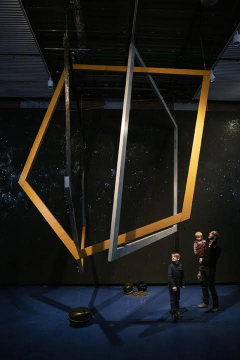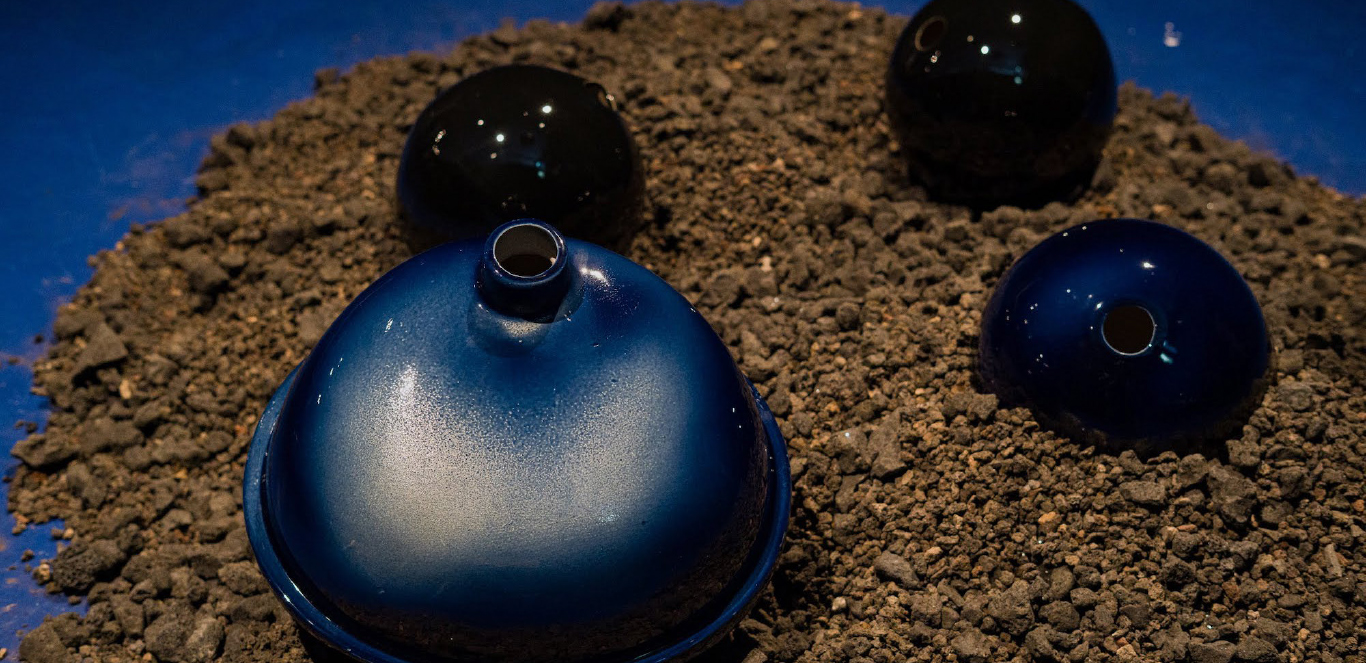
Folayemi Wilson & The Black Psychic Space
Folayemi Wilson is an artist who dares to use imagination to speculate about futurity, and otherwise possibilities. Wilson is an educator, object and image maker, student, and speculative thinker. Her work explores the Black Atlantic experience and, through the device of science fiction, rememory, and reimagined history, she explores objectivity as it relates to the Black American narrative(s). As a studier of art history and furniture making, the focus on vernacular and utilitarian objects becomes infused in the aesthetic of her work.
During the 16th century, the phenomenon known as the Cabinet of Curiosities emerged among European scientists and aristocrats. Also known as Kunstkabinett, Kunstkammer, or Wunderkammer, translated from German to mean Cabinets of Wonder, these rooms contained a Smörgåsbord of collectibles that signified, at best, the curious minds belonging to the modern West, and at worst, the precursor to colonial capture and exploitation of things these collectors did not own, in the form of exhibition. These cabinets were the progenitors of the modern museum. One of the earliest documentations of these rooms is by Ferrante Imperato, entitled Dell’Historia Naturale (Naples 1599). The work is an engraving that depicts a concave ceiling with an alligator at the center, surrounded by a variety of crustaceans and small beings that elude identification. Small furry animals appear to scurry across the floor. Dishes are revealed in lowersheleved cabinets. Books are stacked sky high, while crane-like birds rest in the crevices of higher shelves in the room. White male figures in aristocratic attire gawk around the room in awe. Like most depictions of the Wunderkrammer, the scene is bizarre. Hybrid animals appear, a series of taxidermies and other unforeseen beings are rendered into the small room. It begs to question how collectors of such things became moved to do so? What about these items incited so much curiosity, that they had to be captured and even contained in an interior space to be studied for extended periods of time?
Cabinets of Curiosities precede the centuries of the Enlightenment Period that follow soon after, an intellectual movement initiated by Europeans that championed revolutions in art, science, and philosophy. The era also propelled the movement of modernism forward, and the acceleration of colonial rule in indegenious countries throughout the world. This lineage could be tied to the emergence of the World Fairs in Europe and the United States, that served as a means to “define and boost national identity through commemorative events” centered around visual taxonomy of humans, plants, animals, and new industrial technology.[1] From this perspective, Cabinets of Curiosities indicate an epoch of theft and interpretation through the account of European men. As the scholar Bruno Latour has lamented, this modernity needs to be recalled, specifically through an anthropological, epistemological and ethnographic lens because of this non democratized institutionality.[2] Artists are known to help us gesture toward these possibilities beyond the impression of coloniality and a primarily white patriarchal heteronormative gaze.
Eliza’s Peculiar Cabinet of Curiosities
In 2016, Wilson invoked the 16th century rooms of wonder in a multi-layered installation entitled Eliza’s Peculiar Cabinet of Curiosities at the Lynden Sculpture Garden in Milwaukee, Wisconsin. The work’s central object is a small slave cabin made of wood. Inside, the sculpture contained a reimagining of the European wunderkammer, incorporating sounds, images, and video that lend to a desired future from the perspective of a fictionalized enslaved person. However, the work imagines Eliza not as a person in bondage, but as an anthropologist, a naturalist, a collector, a curator of a museological space, and most importantly a thinker who is worthy of authoring their own space. In the 2019 essay by scholar Christina Sharpe, “Beauty as Method,” the writer remarks how her mother utilized the claim of authorship to her own modest domain, as a practice and insistence of beauty. Beauty as method, in turn, and in Sharpe’s retrospective view of her childhood, became a way for her mother to protest against the perils of white supremacy and other oppressions that lingered outside of her door. “She brought beauty into that house in every way that she could.” Sharpe writes. “She worked at joy, and she made livable moments, spaces, and places in the midst of all that was unlivable there, in the town we lived in; in the schools we attended; in the violence we saw and felt inside the home while my father was living and outside it in the larger white world before, during, and after his death.”[3]
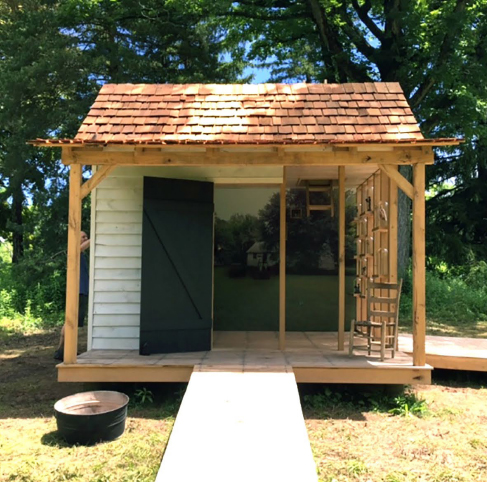
We could consider Eliza’s impulse to collect in this manner. Not as a way to capture and impose interpretation on like the white male fore bearers of the original Cabinets, but rather an attention to honor the past, present and future through a celebration of beauty in the interior.
Included in the structure is an enlarged colonial black and white image found by Wilson, of a family that was married on Emancipation Day in 1863. Folayemi Wilson finds out that the husband in the photo was a free man who purchased his wife named America, so she too could be free, soon before they married. On the ground in the space, there is a small circular portal that reveals video of the Mississippi River. There is another video in the space, that requires a viewer and visitor to stoop, to fully see it. The moving image is archival footage of “The Georgia Shouters,” from the 1930s, depicting a group of Ring Shout dancers, conducting rhythmic movement, indicative of the clan destined gatherings enslaved Black people carried out prior to emancipation. Eliza’s Peculiar Cabinet of Curiosities is a gallery of furtive survival and self sovereignty through the platforming of collectible items and amulets. A gesture that is crucial to survival in a Black embodiment.
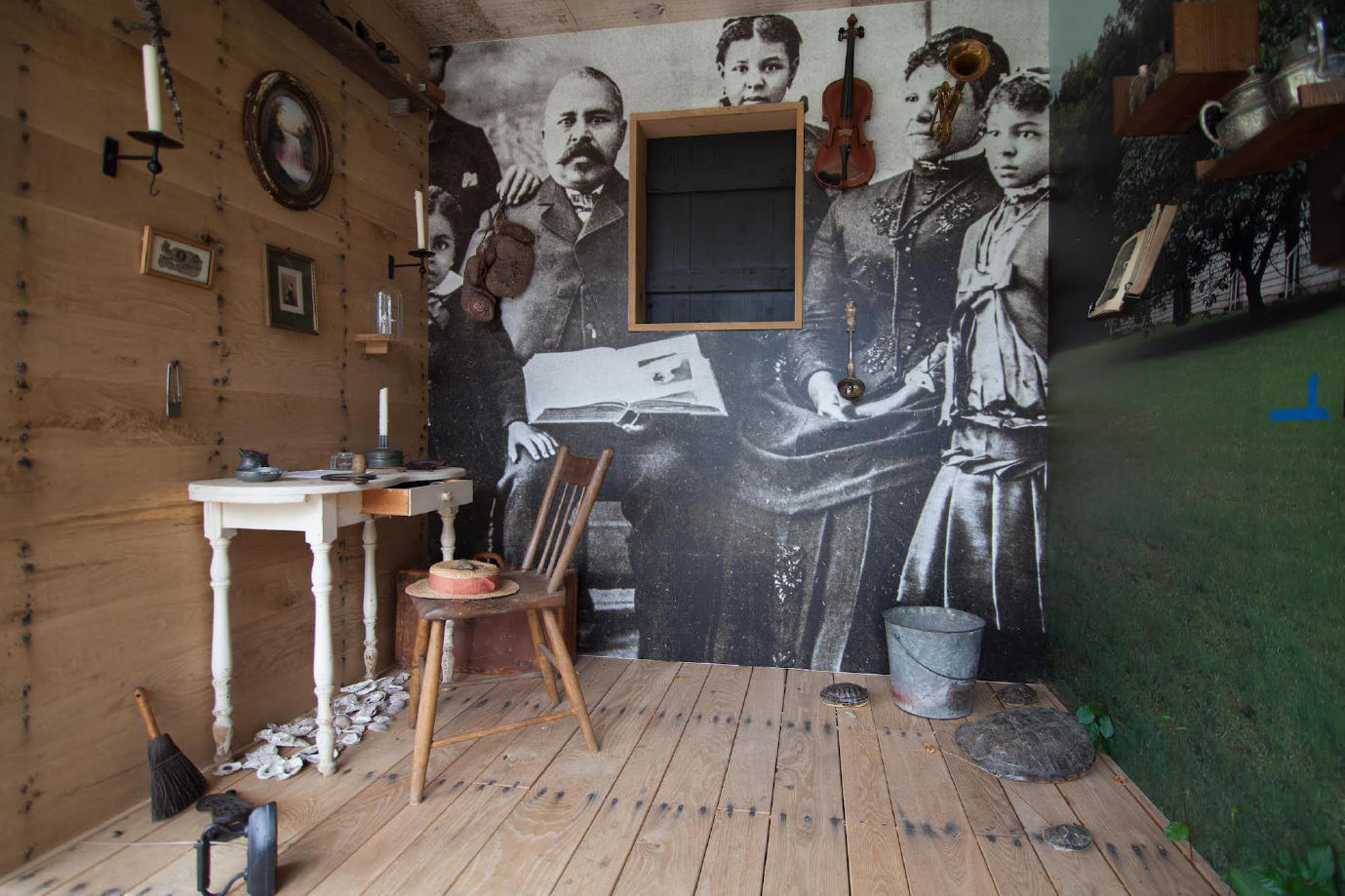
Dark Matter
In Dark Matter: Celestial Objects as Messengers of Love in these Troubled Times (2019), made by Wilson, she offers a fully immersive space that is dark and blue. The space is constructed in such a way, to make the viewer feel like they are traversing into another world. The shotgun house, central to her previous work Eliza, is also on display through abstracted form, suspended in the space at Gallery 1 & Jackman Goldwasser Catwalk Gallery in Chicago. Smooth, slick orbs hang from the ceiling and rest on the floor. There is a soundscape that accompanies the enveloping space to engender and prioritize a somatic reckoning for the exhibition’s visitors. Throughout its duration, visual artist and poet Krista Franklin and jazz composer Ben LeMar Gay were invited to respond to the show through their craft performances.
In retrospect, the work recalls the literary endeavor by the American novelist Toni Morrison, entitled Love. The narrative centers around the character Bill Cosey and the rhizomatic romantic entanglements he has with the women in his life. More significantly though, there is an elusive character in the book, named Celestial, who ultimately serves as an almost amorphous figure, and an unexpecting binding agent in repairing a relationship between two women in Cosey’s life who had long been estranged. More significant is the way communication is shared between these women. Through the form of the vernacular piglatin, they honor their lives together as friends before the rupture. It is through this opaque and secret form of communication that love is enabled again and made possible between the two women.
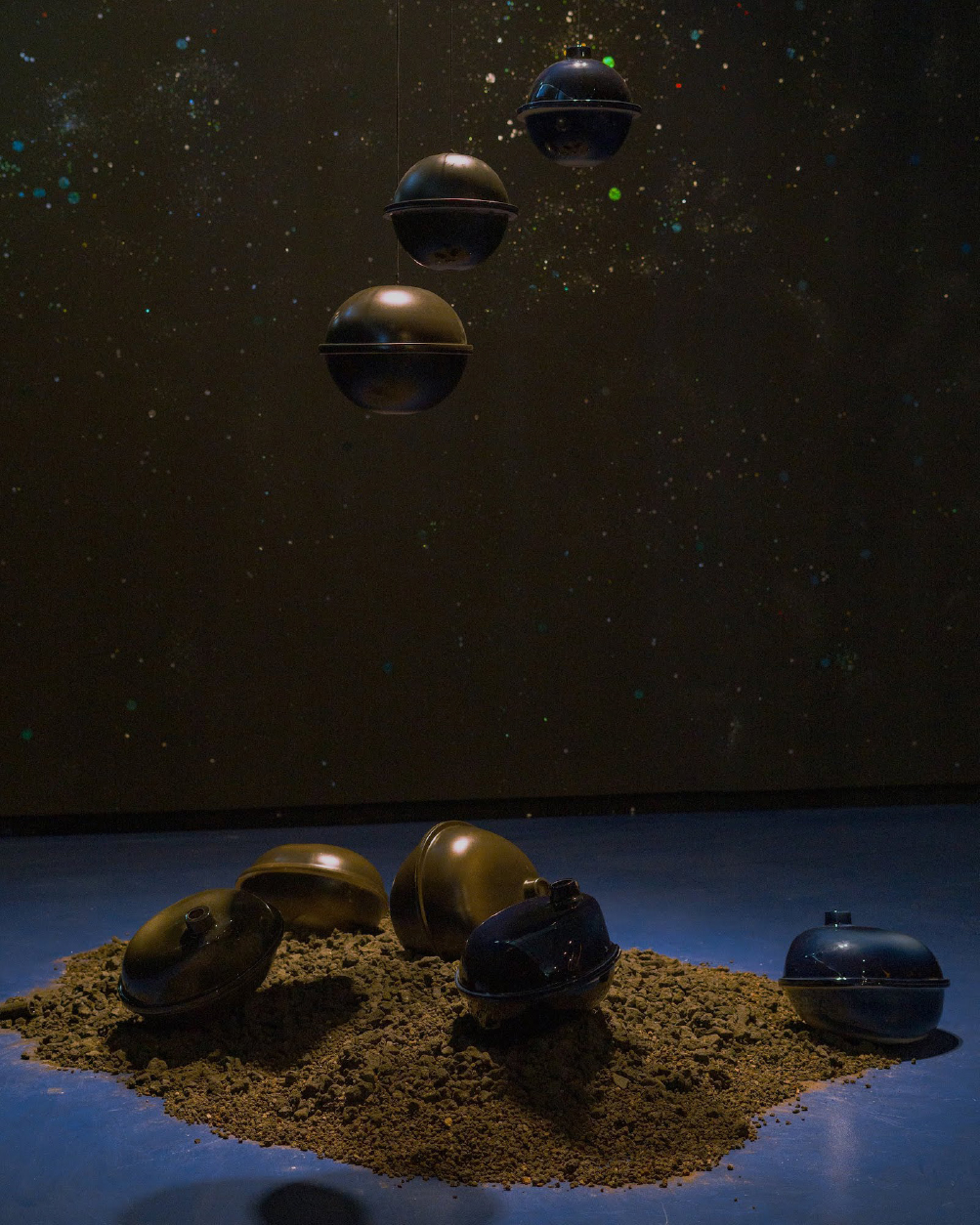
While occupying distinct polarities in narrative, Dark Matter and Love both explore the unending opportunities that might be explored through the epistolary, of intimate correspondence, out of a desire to work through troubled times. In Wilson’s work, the fictitious characters have made contact with otherworldly beings. These beings offer up data and pathways for transcending beyond the current state of things.
Wilson made this work prior to the epoch of the year 2020. In many ways, this work becomes an intuitive and prophetic call to wonder about recovery. I would argue that we have nothing left to do but dream about the uncanny encounter, potentially with celestial beings. Nothing but wonder and longing plagues us after so much grief and suffering. In this way, Wilsons work is a prompt to submit to such impulses, out of fulfilling a desire of complete freedom.
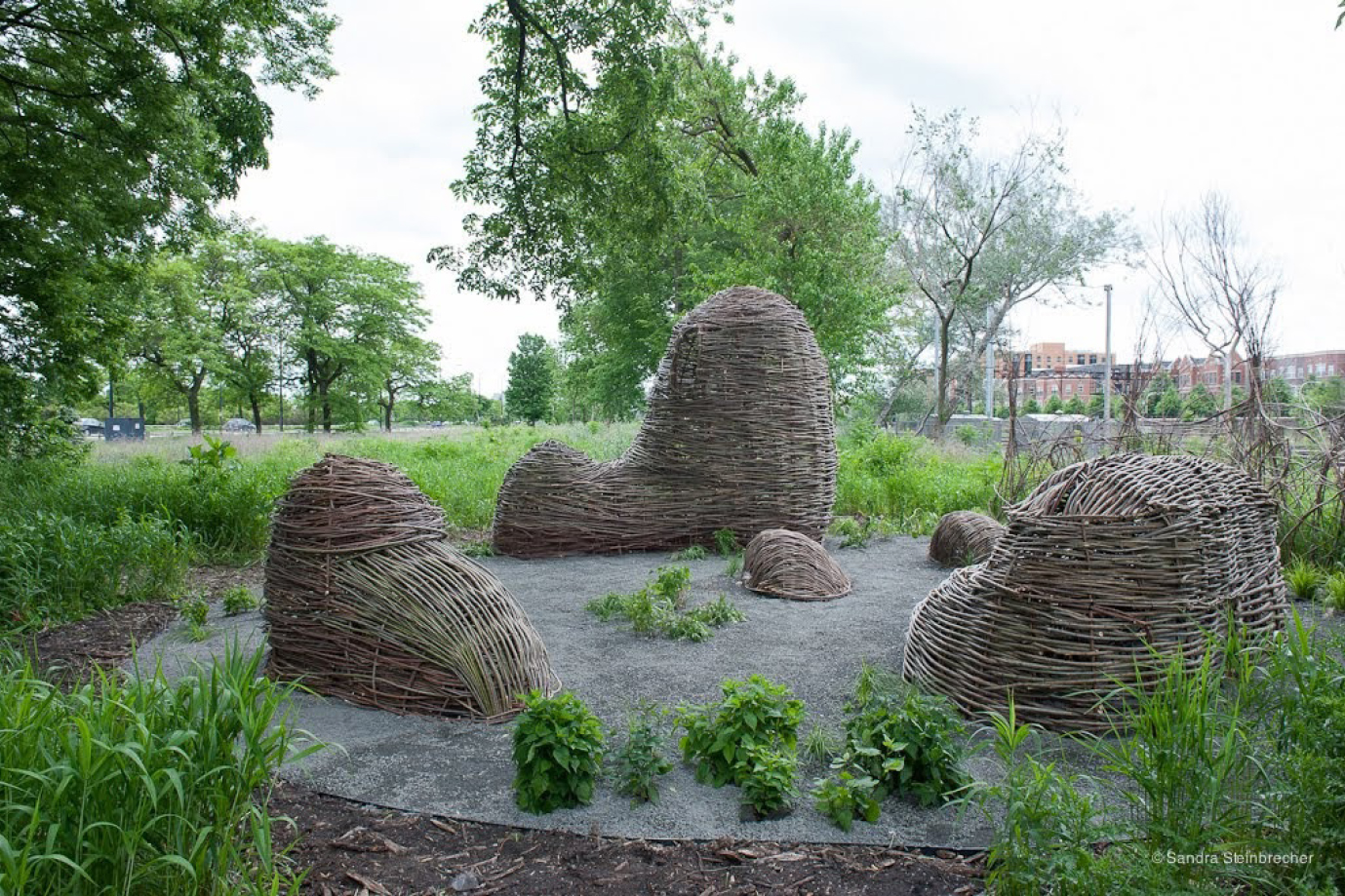
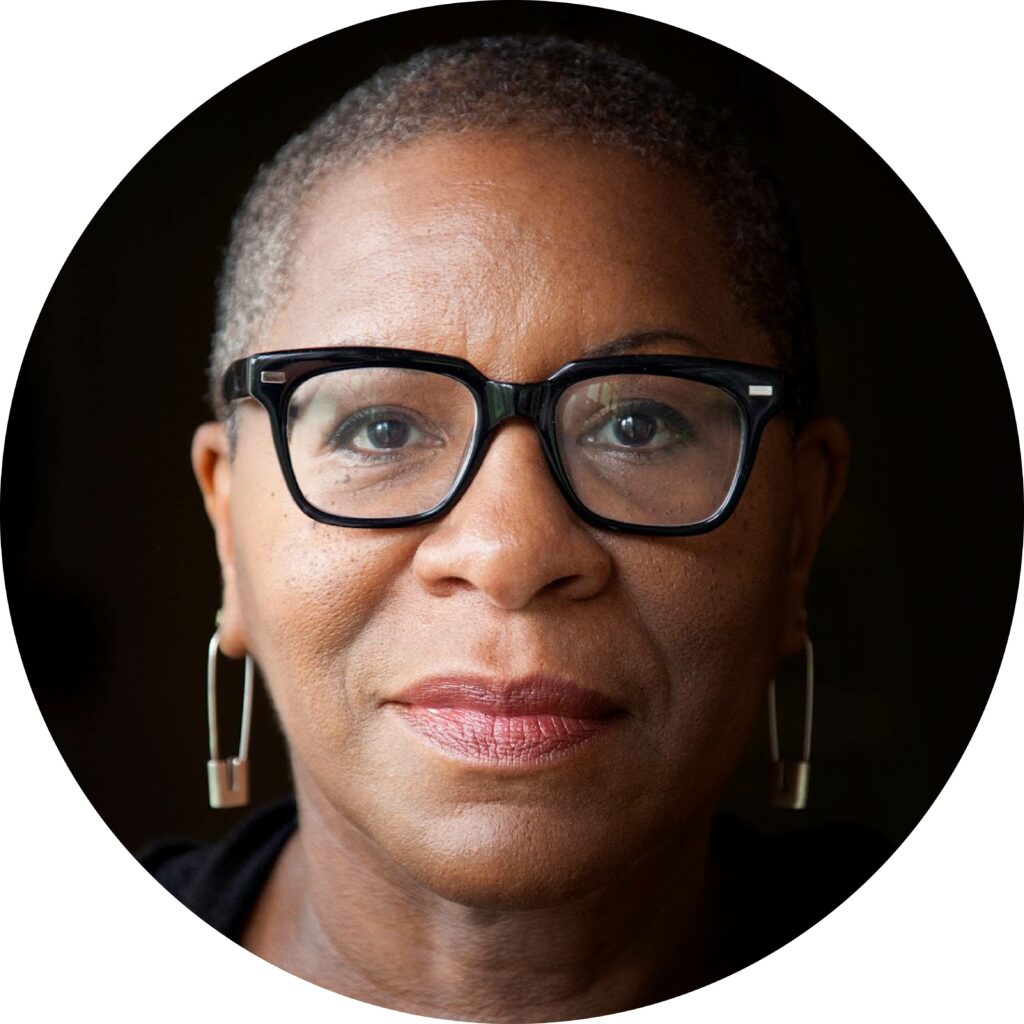
FO WILSON
Fo Wilson (Folayemi) is an artist/designer, educator, independent curator and writer. Her studio practice crosses interdisciplinary boundaries between the visual art, sonic media, a regard for the handmade, a background in design and object making, and an Afrofuturist expression of blackness. Wilson earned a MFA from the Rhode Island School of Design and is an Associate Professor at Columbia College Chicago. She was honored as a 2015 3Arts awardee, and received a 2016 Graham Foundation grant.
Wilson lectures about art, design and craft to international audiences, and her writing and reviews have appeared in NKA, Journal of Contemporary African Art, the International Review of African American Art (IRAAA), and Communication Arts. Wilson was the 2013-14 Inaugural Faculty Fellow at the Center for Black Music Research (CBMR) and has been awarded residencies or fellowships at ACRE, Anderson Ranch Arts Center, Djerassi residency program, Haystack Mountain Center for Craft, Kohler Arts/Industry program, Macdowell Colony, and Purchase College/SUNY Purchase New York. She has been a grant recipient of Creative Time, the National Endowment for the Arts, and the Propeller Fund, and her design work is included in the collection of The Cooper Hewitt National Museum of Design.

TAYLOR ALDRIDGE
Taylor Renee Aldridge is a writer and independent curator who has dedicated much of her early career to documenting (in)equities that exist within systems throughout the “art world”. In 2015 she co-founded ARTS.BLACK (“arts dot black”), a journal of art criticism from Black perspectives.
Taylor is continuing to examine dynamics of power and ethics that exist, or run scarce within creative sectors in and outside of her hometown, Detroit, Michigan. Concurrently she is pivoting towards queries that concern performance, Blackness, satisfaction, spectatorship, and the queering of the sacred.
Taylor has held a curatorial position at the Detroit Institute of Arts, and has worked with the N’Namdi Center for Contemporary Art, the Ethelbert Cooper Gallery of African & African American Art, and The National Museum of American History (Smithsonian Institutions). She is the 2016 recipient of The Andy Warhol Foundation Creative Capital Arts Writers Grant for Short Form Writing. Taylor has written for Art21, ARTNews, ContemporaryAnd, Detroit MetroTimes, SFMoMA’s Open Space and Hyperallergic. She received her M.L.A from Harvard University with a concentration in Museum Studies and B.A from Howard University with a concentration in Art History. She is currently in her Saturn Return.
